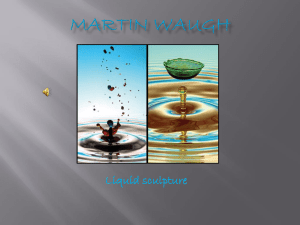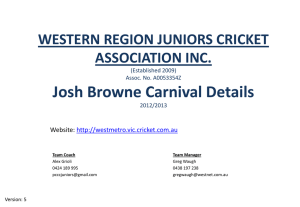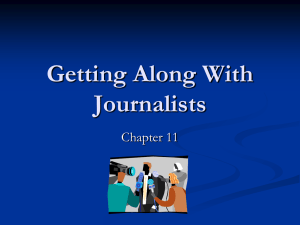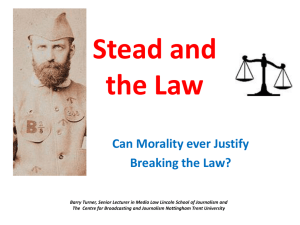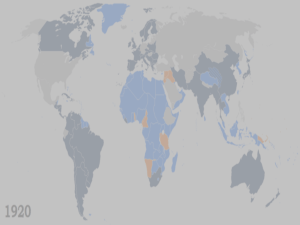JN 510 week 7 Scoop and late 30s fictions
advertisement
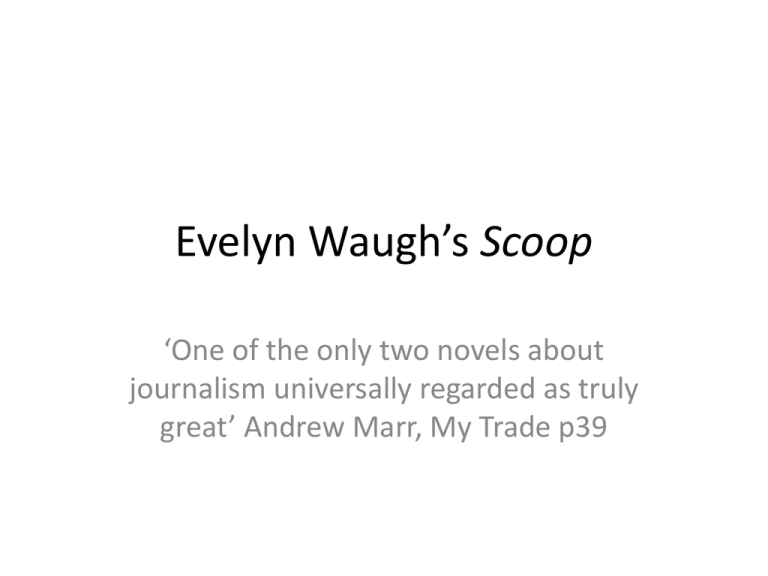
Evelyn Waugh’s Scoop ‘One of the only two novels about journalism universally regarded as truly great’ Andrew Marr, My Trade p39 Evelyn Waugh • Born 1903, younger of two brothers, to a well to do upper middle class family of writers, publishers, doctors etc. • Was a precocious writer, started writing novels and the age of 7 ‘The Curse of the Horse Race.’ • Published Decline and Fall (1928), Vile Bodies (1930), Black Mischief (1932), A Handful of Dust (1934), Scoop (1938) and Brideshead Revisited (1945). • His right-leaning tendencies and Catholicism made him instinctively take the Italian side in the Abyssinian crisis of 1935-6. Letter to Diana Cooper, September 1935: ‘I have got to hate the Ethiopians more each day goodness they are lousy and I hope the organmen gas them to buggery.’ (Italians bombed Ethiopian villages and oases with mustard gas). First experience of newspapers • After University he was sacked from his job as a teacher at a boys’ prep school, for drunkenness and for trying to seduce the matron • Via a contact, is given an interview for a trial on the Daily Express in March 1927. • (Diary entry April 1927): ‘I am in doubt at the moment whether to go on the Express or write a biography (of Rossetti)’ chooses newspapers. • (Diary entry May 9 1927) ‘I find the work exhilarating tho’ much of it is just sitting about in the office’ • (Diary entry May 23 1927) ‘I have got the sack from the Express and am looking forward to a holiday…papers are full of lies’ Ambiguous attitude to papers • As a struggling young novelist, writing for newspapers brought him much needed extra income. • Article in the Graphic, May 1930, ‘The books you read’: ‘The average sophisticated novelist sits down to earn his [money] from the penny daily in the mood of apology. He hopes that his friends will not see his article, and he puts in several sly allusions to any who do that his tongue is in his cheek. He tries to secure the rewards to popular acclamation while remaining aloof from popular sympathy.’ • Diaries – drinks champagne to celebrate securing a weekly article for the Daily Mail for £20 a time. Entry May 20 1930: ‘Peters made Dixon [of the Daily Mail] pay £30. That brings my regular income temporarily up to £2,500 a year. I feel rather elated about it.’ • Next week: ‘wrote Daily Mail article. Talked of lesbians and constipation’ Vile Bodies (1930) • About the ‘Bright Young Things’ of London and the gossip columnists who chart their doings in the press: • The social editress read… ‘Can’t have Kitty Blackwater,’ she said. ‘Had her yesterday. Others’ll do. Write ‘em down to a couple of paragraphs…We’ve got to keep everything down for Lady M’s party. I’ve cut out the D of Devonshire altogether…’ Introducing… • At Archie Schwert's party the fifteenth Marquess of Vanburgh, Earl Vanburgh de Brendon, Baron Brendon, Lord of the Five Isles and Hereditary Grand Falconer to the Kingdom of Connaught, said to the eighth Earl of Balcairn, Viscount Erdinge, Baron Cairn of Balcairn, Red Knight of Lancaster, Count of the Holy Roman Empire and Chenonceaux Herald of the Duchy of Aquitaine, "Hullo," he said, "isn't this a repulsive party? What are you going to say about it?" for they were both of them, as it happened, gossip writers for the daily papers. • At the time, Lord Valentine Castlerosse was gossip columnist for the Daily Express Headlines in Vile Bodies • • • • PEER’S DAUGHTER’S DOVER ORDEAL SERIOUS ALLEGATIONS BY SOCIETY BEAUTY HON A RUNCIBLE SAYS ‘TOO SHAMING’ Sorry end of gossip columnist • After a humiliating experience at a society party, one of the columnists ends up putting his head in an oven and committing suicide. Haile Selassie’s coronation • Covers the coronation, in 1930 for the Times and the Express; records some of his views of journalists at work in an early travel book, Remote People: (handout) • ‘Here I knew most of the facts and people involved and in the light of this knowledge I found the press reports shocking and depressing. After all there really was something to report that was quite new to the European public…Getting in first with the news and Giving the public what it wants are not always reconcilable.’ Problem with Telegrams • The coronation happened on a Sunday when the Telegram office was closed. Many journalists got round this problem by filing their copy on Saturday (ie before the coronation). Splendid and wildly inaccurate stories about four white horses high stepping to the cathedral etc. • Waugh paid the price for waiting until the Sunday afternoon to send his copy via the Italian embassy . • (Diary entry Tuesday November 4 1930) ‘Cable arrived from Express: ‘Coronation hopelessly late beaten every paper London.’ • Is snubbed by great foreign correspondent Sir Percival Phillips, who turns up in Scoop as Sir Jocelyn Hitchcock. Facts vs Fiction • Waugh was the Daily Mail’s Addis Ababa correspondent during the Italo-Ethiopian War of 1935-6 • Although much of it fictionalised, the novel was also a result of Waugh’s observations of foreign correspondents at work – their obsession with getting the ‘scoop’ and their pack instincts. Background • Although largely forgotten now, during the six months prior to Italy’s invasion on October 3 1935, Abyssinia was the focus of the world’s attention. • 120 foreign correspondents descended on Addis Ababa, after Benito Mussolini declared his intention to invade. • Observers feared a second world war as England and France had hinted they would step in to protect the country – they had interests in Aden and French Somaliland respectively. Italy’s colony was neighbouring Eritrea. • Abyssinia was just about the only major region in Africa not colonised by a European power. • On November 2 1930, Ras tafari Makonnen was crowned Emperor Haile Selassie I at Addis Ababa From Waugh in Abyssinia, an account of his war correspondence, published 1936 • [1935]‘Abyssinia was news…Travel books whose first editions had long since been remaindered were being reissued in startling wrappers. Literary agents were busily peddling the second serial rights of long forgotten articles…Files were being searched for photographs of any inhospitable-looking people – Patagonian Indians, Borneo headhunters, Australian aborigines – which could be reproduced to illustrate Abyssinian culture. Two English newspapers chose their special correspondents on the grounds that they had been born in South Africa. In the circumstances anyone who had actually spent a few weeks in Abyssinia itself, and had read the dozen or so books of the subject, might claim to be an expert, and in this unfamiliar but not uncongenial disguise I secured employment with the only London newspaper which seemed to be taking a realistic view of the situation as a ‘war correspondent’. (p.49) Waugh in Abyssinia contd • ‘There followed ten inebriating days of preparation lived in an attitude of subdued heroism before friends, of knowledgeable discrimination at the tropical outfitters…. In the hall of my club a growing pile of packing cases, branded for Djibouti, began to constitute a serious inconvenience for the other members. There are few pleasures more complete, or to me more rare, than that of shopping extravagantly at someone else’s expense. Thought I had treated myself with reasonable generosity until I saw the luggage of my professional competitors – their rifles and telescopes and antproof trunks, medicine chests, gas-masks, pack saddles and vast wardrobes of costume suitable for every conceivable social or climatic emergency. Then I had an inkling of what later became abundantly clear to all, that I did not know the first thing about being a war correspondent.’ (p.50) Compare this account to Boot’s preparations • ‘I want some cleft sticks, please,’ said William firmly. • The General’s manner changed abruptly. His leg had been pulled before, often…’What the devil for? He asked tartly. • ‘Oh just for my despatches you know.’…Miss Barton was easier to deal with. ‘We can have some cloven for you,’ she said brightly. ‘If you will make a selection I will send them down to our cleaver.’ • William, hesitating between polo sticks and hockey sticks, chose six of each…By the time she had finished with him William had acquired a wellperhaps over-furnished tent, three months’ rations, a collapsible canoe, a jointed flagstaff and Union Jack. A hand-pump and sterilising plant, an astrolabe, six suits of tropical linen and a sou’wester, a camp operating table and a set of surgical instruments, a portable humidor, guaranteed to preserve cigars in condition in the Red Sea and a Christmas hamper complete with Santa Claus costume and a tripod mistletoe stand, and a cane for whacking snakes…At the last moment he added a coil of rope and a sheet of tin; then he left under the baleful stare of General Cruttwell.’ (p.45) Waugh and Boot • Both share the characteristics of the ingenu outsider, observing, rather than being part of, the press pack. • Boot lacks Waugh’s intelligence and spite Frustration in Addis Ababa • After Italian troops invaded Ethiopia, correspondents were restricted to Addis, left kicking their heels • During this time however, observing the other reporters at close hands, the idea of writing a comic novel occurred to him: ‘The telephone to the north is cut and the only news we get comes on the wireless from Europe via Eritrea [a neighbouring Italian colony]. No one is allowed to leave Addis so all those adventures I came for will not happen. Sad. Still all this will make a funny novel so it isn’t wasted.’ (letter to Laura Herbert, October 1935, The Letters of Evelyn Waugh). His time cooped up with correspondents he despised provides fertile material in Scoop • In a letter to Laura Herbert, described foreign correspondence as ‘blackleg labour’. • Scoop: ‘…Corker recounted the heroic legends of Fleet Street; he told of the classic scoops and hoaxes; of the confessions wrung from hysterical suspects; of the innuendo and intricate misrepresentations, the luscious detailed inventions that composed contemporary history; of the positive, daring lies that got a chap a rise of screw; how Wenlock Jakes, highest paid journalist of the United States, scooped the world with an eye-witness story of the sinking of the Lusitania four hours before she was hit; how Hitchcock, the English Jakes, straddling over his desk in London, had chronicled day by day the horrors of the Messina earthquake…’(p.66) Wenlock Jakes: H R Knickerbocker of Hearst’s International News Service (INS) • Knickerbocker was a respected authority in foreign affairs throughout 20s and 30s. Invited by the Nazis to cover the 1923 Hitler Rally; won a Pulitzer for his coverage of Soviet purge trials in 1933; got a scoop by interviewing Stalin’s mother; scooped other correspondents in Ethiopia by being the first to report Haile Selassie’s abdication in the last days of the war. Although Waugh professed not to care, he was jealous of Knickerbocker’s success. • ‘I am a very bad journalist. Well only a shit could be good at this particular job.’ (Letter to Penelope Betjemamin, November 1935) Wenlock Jakes in Scoop • ‘Once Jakes went out to cover a revolution in one of the Balkan capitals. He overslept in his carriage, woke up at the wrong station, didn’t know any different, got out, went straight to an hotel and cabled off a thousandword story about barricades in the streets, flaming churches, machine guns answering the rattle of his typewriter as he wrote, a dead child, like a broken doll, spreadeagled in the deserted roadway below his window – you know • ‘Well, they were pretty surprised at his office, getting a story like that from the wrong country, but they trusted Jakes and splashed it in six national newspapers. That day every special in Europe got orders to rush to the new revolution. They arrived in shoals. Everything seemed quiet enough, but it was as much as their jobs were worth to say so, with Jakes filing a thousand words of blood and thunder a day. So they chimed in too. Government stocks dropped, financial panic, state of emergency declared, army mobilised, famine, mutiny and in less than a week there was an honest to God revolution under way, just as Jakes had said. There’s the power of the press for you.’ Waugh and Jakes/Knickerbocker • Started out as being friends in Addis, playing poker together to relieve the tedium. Used to get drunk and fight each other. Knickerbocker was fascinated by Waugh. His relationship with Knickerbocker underlines the confused role Waugh played in Addis: hard drinking, pugnacious, experienced traveller; displaced London clubman; a novelist paid to be a journalist; the spoilt, moody, fractious child Sir Jocelyn Hitchcock: Sir Percival Phillips of the Daily Telegraph • Was the source of the real scoop in Scoop, the discovery of the emperor’s secret deal with an American business corporation • Phillips and Associated Press correspondent Jim Mills, working as a team, reported the scoop of the sale of a 75-year oil and mineral concession, known as the Rickett concession. The deal threatened to bring the US into the conflict to defend its ‘economic interests’. Sir Jocelyn Hitchcock in Scoop • Makes up the story of how he interviewed a fascist leader in Laku, when he made it up in his hotel room • Haughtily leaves Ishmaelia he bids farewell to Boot: ‘Goodbye Boot, remember me to them at the Beast. I wonder how they are feeling now about having missed the Laku story.’ • (Boot is told by an old school friend that Laku is Ismaelian for ‘I don’t know’ and that there is no such place.) • After Sir Jocelyn leaves, Boot gets the real scoop, the Fascist coup and the counter coup in Ishmaelia. The Telegraph fights back • Immediately recognised the satirisation of its correspondent, who had since died. Reminded readers that Waugh used literary license when he had Hitchcock miss the scoop: ‘At this point Mr Waugh does less than justice to his distinguished original. He makes Hitchcock return early in the war. This leaves the ‘scoop’ of the title to be obtained by the novel’s incompetent hero. Actually as will be remembered, Phillips’ famous message from Addis Ababa to the Daily Telegraph revealing the Rickett concession was not only the war’s biggest scoop but one of the greatest scoops in modern journalism.’ Daily Telegraph, June 2 1938, p.17 Mr Pappenhacker: George Steer • George Steer, a South African (educated in England) had been hired by The Times. Although young an relatively inexperienced, he did such a good job in Abyssinia that The Times was able to sell his despatches on to the New York Times, and pay Steer £80 a month. • Waugh resented Steer’s capacity for hard work, the fact that Steer had been to a better public school than him (Winchester vs Lancing) and disparaged him as a ‘colonial’. Steer’s non-fiction book, Caesar in Abyssinia received far more critical acclaim that Waugh’s Waugh in Abyssinia. Mr Pappenhacker in Scoop • ‘Mr Pappenhacker of the twopence was playing with his toy train – a relic of college at Winchester, with which he invariably travelled. In his youth he had delighted to address it in Lain alcaics and to derive Greek names for each part of the mechanism. Now it acted as a sedative to his restless mind.’ • Here Waugh is deriding Steer’s youth (25 to Waugh’s 31) and his double first in Classics (Waugh got a third in History). Steer’s career • Steer went from Abyssinia to the Spanish Civil War where he distinguished himself particularly in reporting the Guernica bombing. It was he who discovered shell remnants on the ground that clearly showed they were of German origin. His reports inspired the most famous anti-war image of the day: Picasso’s Guernica Other fact:fiction examples Fact: • The hotel where the journalists stayed: ‘The Splendide at which we all assumed we should stay…was completely full with journalists and photographers living in hideous proximity, two or three to a room even in the outbuildings…The less his guests ate the greater his profits, and from his untidy little desk in the corner he watched with sardonic amusement the crowds of dyspeptic journalists…furtively carrying into his dining room paper bags of fresh bread, tins of tuck and pocketsful of oranges and bananas, like little boys trooping in to tea at their private schools…Nothing of the smallest value was endangered in the scenes of violence which became increasingly frequent as the journalists made themselves at home. When his guests threw their bedroom furniture out of the window, he noted it in the weekly bill…Menageries of unclean pets were introduced to the bedrooms…’ (Waugh in Abyssinia p.66) • Waugh, like Boot decamps to a small German guesthouse • However while Waugh was at the Splendide it was he who, to relive boredom, bought a baboon Fiction • ‘In the next room were four furious Frenchmen…They were composing a memorandum of their wrongdoings…In the next room, round a little table, sat Shumble, Whelper, Pigge and a gigantic bemused Swede • ‘…Corker and William sat down to luncheon. The menu did not vary at the Liberty; sardine, beef and chicken for luncheon, soup, beef and chicken for dinner; hard homogenous cubes of beef…fibrous spindles of chicken with grey-green dented peas (p.105) • ‘The bunch now overflowed the hotel. There were close on fifty of them. All over the lounge and dining room they sat and stood and leaned…There was not much sleep that night for anyone in William’s room. The photographer who was dossing down found the floor wet and draughty (pp107-8) Waugh/Boot and telegrams • Cabled the Daily Mail, to deny a report of an American nurse being blown up: ‘Nurse Unupblown’ • Series of odd Telegrams sent by Boot such as ‘Unproceed Lakuward’ • Waugh did often feel like a fish out of water amongst the real reporters. Once he got a real scoop, so to avoid it getting stolen by any of his rivals he cabled it in Latin. The Daily Mail subs, unable to read it in London, binned it. Waugh’s criticism of contemporary journalism • Although Scoop is humorous, it contains a deeper criticism of how foreign correspondents operated, as he described it in Waugh in Abyssinia: • ‘To the hordes of competing journalists the government communiques were of negligible value. They were transmitted instantly in full by Reuters and gave no material for the special news which the editors were demanding…An exclusive lie was more valuable than a truth which was shared by others. ..’ Were these criticisms justified? • The Rickett episode did actually happen and illustrated the febrile atmosphere in which journalists worked when covering foreign stories • There were also real examples of journalists not following up tip offs carefully enough so they could not confirm the veracity of stories • However, much of the darker side of this satire can be attributed to Waugh’s jealousy of the correspondents, his inability to file stories quickly enough, the memory of the reprimand of his previous tour of duty in Abyssinia and a general snobbish attitude to the majority of journalists who he felt were of an inferior class to him – Corker, Shumble, Pigge and Whelper are given deliberately lowly saxon names to emphasise their social inferiority. Despite the searing satire, Scoop is perennially popular amongst journalists • ‘Some correspondents still study Scoop regularly for such skills as wastebasekt rifling, expense account padding and mythweaving’ (Mort Rosenblum, Coups and Earthquakes, Reporting the World for America, 1979) • ‘the best book ever written about the press and the only one to capture the quintessential absurdity of our calling.’ (Edward Behr, Bearings: A Foreign Correspondent’s life behind the lines, 1978) • ‘Waugh at the mid-season point of his perfect pitch’ (Christopher Hitchens, Introduction to Penguin Classics edition of Scoop, 2000) The character of William Boot • Widely accepted as being a caricature of W F Deedes, the long-serving journalist and recently late, of the Daily Telegraph. When Waugh met him in Abyssinia he was the gawky yet charming new young recruit to the very upmarket Morning Post, which was absorbed into the Daily Telegraph in 1937. Deedes has always been coy about the association • He is the classic ‘idiot savant’ whose inability to understand the inner workings of journalism expose them as absurd. Is Boot a journalist? • Edits ‘Lush Places’ on a freelance basis for the Daily Beast, from his home in Boot Magna. • The lines: ‘Feather-footed through the plashy fen passes the questing vole…’ have passed into folk history as one of the best intros ever crafted. • He submits to the Ishmaelia trip mainly because he has always wanted to fly in an aeroplane, not for any interest in the story. • Submits his ‘scoop’ after the Beast has sacked him • His famous despatch displays a chronic lack of journalistic skills: ‘Nothing much has happened except to the president who has been imprisoned in his own palace by revolutionary junta headed by superior black called Benito and Russian Jew who Bannister says is up to no good they say he is drunk when his children try to see him but governess says most unusual lovely spring weather bubonic plague raging sack received safely thought I might as well send this all the same.’ (p.146) Lord Copper • Lord Copper has lost all grip on reality and his newspapers – and those of his rivals – though full of lies, are all that the reading public have to rely on. Both Waugh from the right and Jameson from the left (In the Second Year) are warning that without access to the truth, the nation is sleep walking towards war. • A theme of Waugh in Abyssinia and Robbery Under Law – that public opinion is based on falsehood spun by journalists and intellectual commentators – is summed up in Lord Copper’s instructions to his newest war correspondent: • ‘The British public has no interest in a war which drags on indecisively. A few sharp victories, some conspicuous acts of personal bravery on the Patriot side and a colourful entry into the capital…We shall expect the first victory about the middle of July.’ • What does this quote tell you about Copper, considering his position as a newspaper baron? Structure of the Press as seen by Waugh • In Scoop the whole system of newspapers is shown to be rotten and completely divorced from reality exemplified in Mr Salter, the foreign editor seen early in the novel poring over an atlas trying to find Reykjavik and ‘ace’ reporter Sir Jocelyn Hitchcock manufacturing his stories from a hotel bedroom. At the apex of this structure is Lord Copper, ignorant – ‘Let me see, what’s the name of the place I mean? Capital of Japan? Yokohama, isn’t it?’ and absurdly impulsive: ‘Memo for tomorrow. “Sack Salter”’ . Handouts • Corker and Pigge • What is he saying about the journalists in these extracts? Corker, Pigge etc • When the press pack sets off for Laku, Corker and Pigge end up as literally and metaphorically lost souls in the scrubland of Ishmaelia, their plight an evident echo of the first lines of Dante’s Inferno: ‘When, in the middle of my life I found myself in a dark forest, where the right path was obscured’: • Presently the track had lost all semblance of unity and split into a dozen diverging and converging camel paths, winding at the caprice of the beasts who had made them, among thorn and rock and anthills…’ (Waugh, 1938, pp135-6) • But whereas Dante the poet and artist finds redemption in being led out of the trackless forest by the classical poet Virgil, the ‘earth-bound journalists’ (Waugh, 1938, p 147) find no salvation: • It was a morning of ethereal splendour – such a morning as Noah knew as he gazed from his patchy bulwarks over limitless sunlit waters while the dove circled and mounted and became lost in the shining heavens…Corker and Pigge here in the mud, stiff and unshaven and disconsolate.’ (Waugh, 1938, p147) Journalists are the damned • Like the damned souls of Inferno, they suffer multiple punishments of several of Dante’s circles: soaked by rain, vainly rolling boulders for miles, lashing out at each other in fury and becoming entombed in the mud. When the weather improves they cannot appreciate it: • ‘Look at the flowers,’ said Pigge. • ‘Yes. Like a bloody cemetery,’ said Corker. (Waugh, 1938, p147) • Waugh is not just making a point about the lack of any spiritual dimension in popular journalism, but he is also making a political point: The Divine Comedy was a diatribe against political corruption in medieval Florence. The excesses of the popular press, Waugh is saying, have a corrosive effect on public opinion and therefore society itself. Those who write for it are the damned A happy ending? • Although Scoop was written at a time when Waugh professes to have been at his happiest – had just got married and writes in his diary how lovely his life, house and wife are at them moment, Scoop has a dark underbelly. • Boot, back in the countryside returns to his column: ‘the wagons lumber in the lane under their golden glory of harvested sheaves, maternal rodents pilot their furry brood through the stubble…’ He laid down his pen. • Outside the owls hunted maternal rodents and their furry brood • The corrupt journalists and newspaper are not just a comment on the press, but on the whole absurd rationalist view of society that papers represent. Other late 30s fictions • Scoop was written in 1938 when war with Hitler’s Germany was inevitable. • Rising fear that just as in WW1 newspapers would not report the truth of what was happening • Also – newspapers, still the dominant medium became an image of people’s fear for what was about to happen. Louis Macneice: Autumn Journal • (handout)
